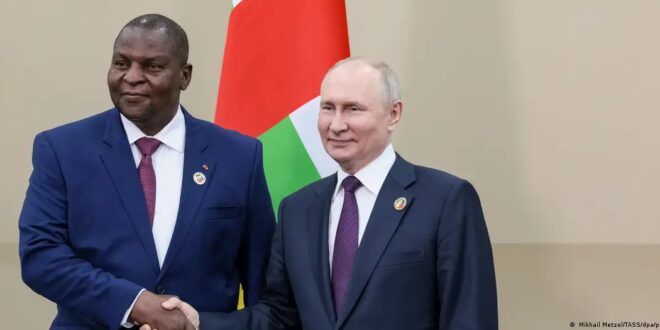The Central African Republic (CAR) is said to be in talks with the US private security company Bancroft Global Development — potentially challenging the influence of Russia’s Wagner Group in the conflict-ridden nation.
Last week, Albert Yaloke Mokpeme, spokesman for the Central African presidency, mentioned the country’s efforts to diversify its relations, seeking assistance from countries like the United States and Russia to train its soldiers.
“The United States is also offering the Central African Republic to train its soldiers, both on Central African soil and on American soil,” Mokpeme said.
While details of the discussions were not made public, Bancroft’s potential involvement suggests a US interest in challenging Russia’s dominance in the Central African Republic (CAR).
US sets foot in Wagner-dominated landscape
This comes as the Wagner Group, a private Russian military group, faces internal turmoil following the August 2023 death of its founder, Yevgeny Prigozhin.
Analysts believe that Western countries see an opportunity to fill the void left by Wagner’s reorganization, something Central African President Faustin-Archange Touadera is counting on.
Touadera hopes to “take advantage of Wagner’s reorganization to weaken his dependence on the Russians,” reported the AFP news agency, citing a European security source.
However, Bancroft denied deploying in the CAR capital, Bangui, but confirmed ongoing discussions with Touadera’s government.
“Beginning in July, Bancroft agreed on a framework to discuss possible future activities with the government of CAR. That is all,” said a Bancroft spokeswoman in a written statement on Tuesday.
CAR government’s balancing act
The Central African government appears to be playing a delicate balancing act. While acknowledging talks with Bancroft, they also emphasized their ongoing cooperation with Wagner, highlighting the need for “diversification of relations.”
This strategy aims to maintain security partnerships with both Russia and the US, potentially leveraging their rivalry to secure favorable deals.
However, concerns have arisen within the country, particularly in Bangui, where fears of a potential clash between Russian and American forces loom large.
The CAR government, through Mokpeme, sought to allay concerns, emphasizing that the presence of Bancroft was solely for training the Central African armed forces.
“In the discussions that are taking place between the Central African Republic and all its partners, we do not want this way of working which suggest that, I am not working with you and not working with the other. No,” the government spokesman explained.
Concerns of cohabitation and escalation
Observers have, however, warned of the dangers of cohabitation between rival forces. Civil society groups fear clashes, particularly over control of mineral resources and strategic positioning.
The potential for human rights abuses and further instability is also a major concern. Karl Blague, a sociologist consultant who is affiliated with G16, a coalition of civil society organizations, was pessimistic.
“There cannot be a cohabitation between the Americans and the Wagner mercenaries with all the abuses they have committed against the Central African population and with all the evidence we have,” Blague said.
Despite the official statements, an anonymous government official mirrored Blague’s sentiments.
“Yes, the US paramilitaries are already there. And that’s a real concern,” he told DW.
Geopolitical implications
On the international front, the CAR’s engagement with Bancroft comes as part of a broader strategy to reduce dependence on Russian-backed Wagner.
French troops, which were deployed in 2013 to stem a civil war, withdrew in 2016, leaving the CAR to bring in Wagner for armed forces training in 2018 officially.
As rebel groups advanced on the capital, additional Russian operatives were hired in 2020. The anonymous official said the Russians are already deeply involved, reducing the potential for clashes.
“I have not yet discussed this with my colleague from Foreign Affairs,” he told DW.
“But what reassures me a little bit is the fact that the Russians are participating in the National Security Council, and the Americans can’t be there without their knowledge, let alone their consent.”
France and the European Union are closely monitoring the situation. While officially denying any connection to Bancroft, the US is likely providing unofficial support through its personnel and resources.
“Many of the personnel will have been former US military. There are personal relationships and tactical contacts that could serve as back channels,” said Colin Clarke of the Soufan Center, a New York-based security think tank.
Meanwhile, Russia is determined to maintain its foothold in the country, with Wagner’s influence still significant.
Political instability paves the way to an uncertain future
Bancroft’s talks are seen as part of a larger geopolitical contest, and the US State Department has affirmed its commitment to the CAR.
“The United States remains fully committed to the partnership with the people of the Central African Republic and will continue to work closely with the Central African government to achieve the shared goals of a peaceful and prosperous Central African Republic that respects human rights and the rule of law,” the State Department said.
As the Central African Republic navigates this delicate geopolitical balancing act, the potential collaboration with Bancroft raises questions about the impact of additional paramilitary forces in the already chaos-ridden nation.
Observers await further developments to see how this improbable cohabitation unfolds and whether it will bring stability or further exacerbate the challenges faced by the Central African nation.
 Eurasia Press & News
Eurasia Press & News




